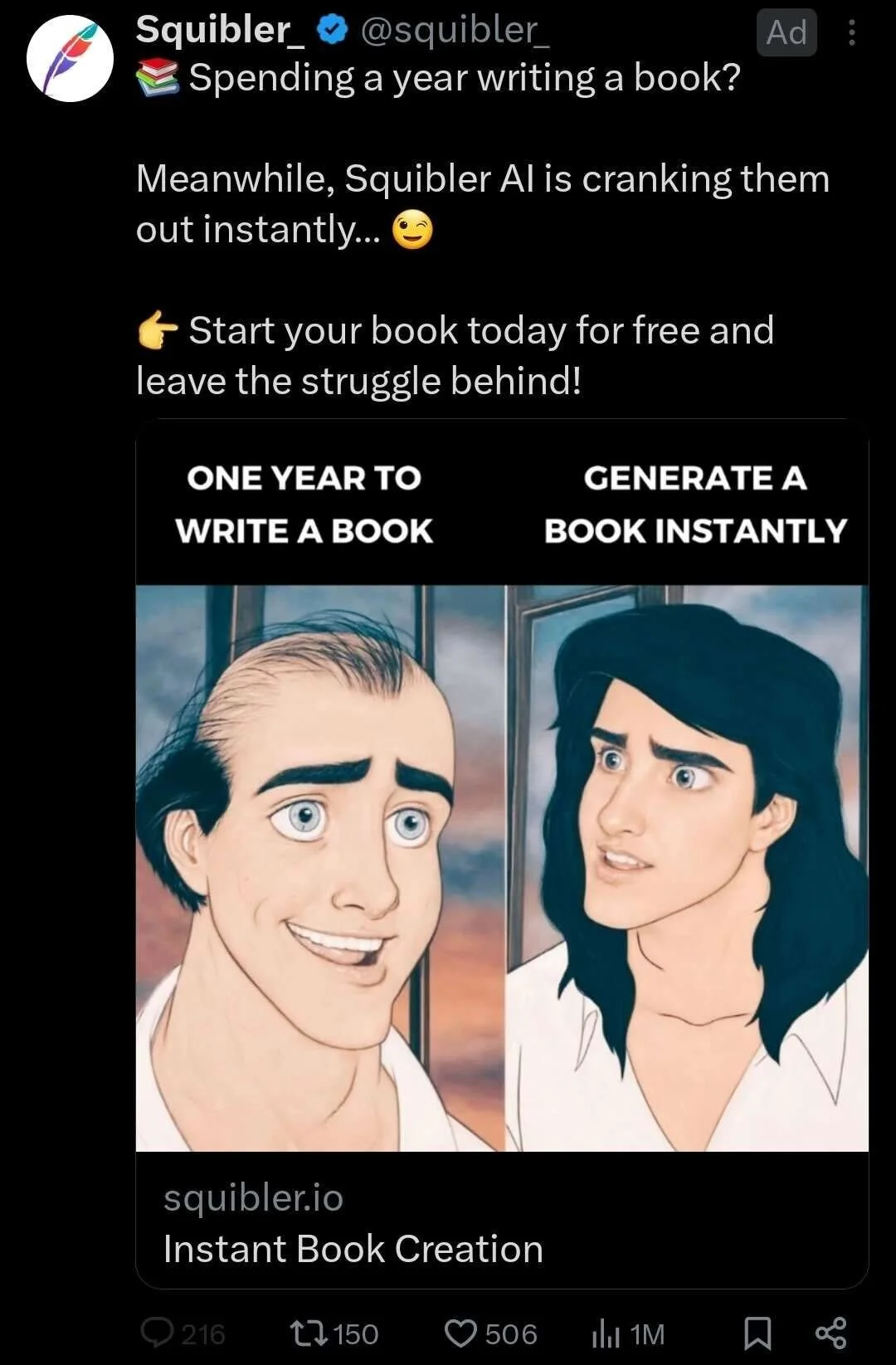Generative AI Is A Danger To the Writing Industry
Artificial Intelligence (AI) is creating waves for all Creatives, and not in a good way. Whether you’re an author, poet, fanfic writer, or anything of the like, AI is directly harming you and we want to help! If you want to read StoryForge's official AI statement, check here.
Writing is already frustrating when you account for the countless hours you sink into your creation. For many writers, it can take years for them to develop their book and when it’s time to query, there are many odds stacked against them. Yet all of these struggles are simply part of the process, and some we wish to alleviate in the near future.
Though, could you imagine how awful it is for authors to see ads, such as Squibler’s, advertising an application that would allow authors to create their books within an hour as opposed to spending a year or more developing it naturally?
Truthfully, it’s an insult.
Before we get too deep into it and explain why this is insulting, what even is generative AI (genAI)? Why does it matter?
GenAI is a form of AI that has the ability to create text, images, audio, videos, or other types of media based on the data that the model had been trained on. Alternatively, there is also another form of GenAI called Large Language Models, or LLMs for short. These are mostly focused on creating text-based content but will accept inputs that include audio, imagery, and so forth. A famous example of GenAI is ChatGPT, which is capable of generating images and text alike.
So, why is any of this bad? It sounds like… innovation! This is great!
Actually, no. It’s really not great.
AI Is Trained On Copyrighted Materials
The awful thing about these models is that they are trained on public works, most of which have been copyrighted. Models such as ChatGPT are built on human data, which allows it to “mimic” the way humans operate, for lack of better terms. You could prompt ChatGPT to write a story for you and you might notice that it spews something rather eloquent and well-worded. That was once a writer’s work. It simply learned from how they wrote and created your prompt based on what it knew.
Respectfully, that is theft.
AI should be thanking us for our beautiful brains and ever-flowing rivers of creativity, yet it’s not.
AI Is Trained On Human Data That Contains Human Bias And Discrimination
Furthermore, since ChatGPT is trained on human data, there are still harmful practices that include bias and discrimination. There is nothing effectively policing the content it generates other than the user themselves. Going past that alone, the uptick in AI usage within the creative fields brings witch hunts that often harm HUMAN authors (and artists) more than it does to the “authors.” For example, K.C Crowne. Crowne was a rather well-known author on Kindle Unlimited (KU), who one day, accidentally left ChatGPT prompts in her newest books. Most fans were left devastated, but who could blame them? How could they have known?
While KU requires authors to disclose when content is AI-generated, it does not require authors to disclose when it is AI-assisted. In K.C Crowne’s case, she argues that she used ChatGPT to edit her work, which qualified as AI-assisted if true. However, it is difficult for readers to believe when too many books are published within the same year. For example, K.C. Crowne’s case, she published 17 books in 2023. Trust is difficult to rebuild for many readers after a situation such as this one is brought to light.
Moving on, the Publishing Industry is not without its faults either.
Generative AI Is Stealing Jobs From Artists, Writers, and Editors
The Dark Romance book named Gothikana by RuNyx had garnered negative reactions due to the cover art featured. Readers are aware of the damage AI-generated illustrations cause for authors, so why would a traditional publishing house such as Tor Books choose to push one? It wasn’t the first time the publishing house pushed a cover with AI-generated assets before as well. Such actions are responded to with review bombs, which harm authors who have little to no control over the cover their publisher chooses. However, Tor Books claims that they had “licensed the image from a reputable stock house and were not aware that it may have been created by AI.”
Read that again.
It reeks of ignorance. They still chose to move forward with the cover despite all the negative feedback they were getting. This is more than enough for readers to understand that the publisher was not interested in correcting their mistakes. If they licensed an image from a reputable stock house, there most likely would not have been AI involved. Even if there was, it would have to be disclosed. Mistakes happen, that’s understandable. However, mistakes should always be corrected once it is acknowledged.
With the emergence of AI, there are also publishers who choose to fully embrace it. One such Publisher is Spines, who aims to disrupt the publishing industry. Their goal is to use AI in order to publish 8000 books within the year alone, charging authors around $1200 to $5000 in order to have their books published (amongst other services, but they claim to have a human editor) while claiming that they are not a vanity publisher. Furthermore, they aim to create audiobook versions of books by using synthetic voices. Eventually, they are working on adding a feature that would clone the author’s own voice. While this streamlining is convenient, it is harmful to the hardworking individuals who come together in the process of publishing. Above all, it’s disheartening to see what lies ahead for many authors who hope to publish their life's work someday.
Alright now, that’s enough doom and glooming. If you made it this far, I’m glad, because all hope is not lost. Creatives are some of the most tenacious bunches to exist and you will find a way to navigate through this. Like we said, we want to help you.
We want to give you the voice you deserve.
At StoryForge, we refuse to back down from the fight against AI. We will continue to protect your work from harmful AI scraping. Your creativity matters and we never plan to integrate gen AI into our platform. This is because Gen AI is not ethical nor is it standard practice and it never will be.
Keep writing, Wordsmiths. Your words matter.

